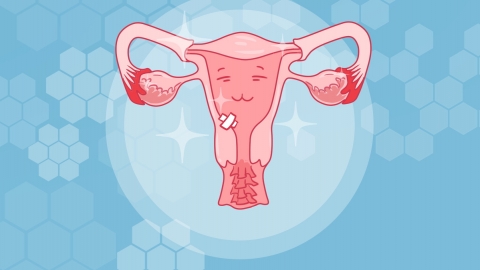What to do about an infantile uterus with no menstruation
Generally, infantile uterus with absent menstruation may be caused by underdeveloped uterus, immature ovarian function, Turner syndrome, congenital adrenal hyperplasia, hypothalamic amenorrhea, and other reasons. At this time, patients can choose general treatment, drug therapy, and other methods to improve the condition according to specific situations. Detailed analysis is as follows:
1. Uterine Hypoplasia
During embryonic development, if the uterus development is impeded, the uterine volume may be smaller than normal, and the endometrium cannot proliferate and shed normally, leading to absence of menstruation. Under a doctor's guidance, medications such as estradiol valerate tablets, progesterone soft capsules, and conjugated estrogens tablets can be used to promote uterine development. Meanwhile, increasing nutrient intake and engaging in appropriate exercise to improve physical fitness are also recommended.
2. Immature Ovarian Function
If the ovaries fail to secrete estrogen and progesterone normally, the stimulation of endometrial growth is affected, leading to absence of menstruation in infantile uterus. With increasing age, some cases may gradually develop. Sufficient sleep should be ensured in daily life, excessive fatigue avoided, and ovarian function improvement promoted.

3. Turner Syndrome
Chromosomal abnormalities lead to underdeveloped ovaries, which fail to produce sufficient hormones, affecting uterine development and causing absence of menstruation. Under a doctor's guidance, hormone replacement therapy can be administered using medications such as diethylstilbestrol tablets, nylestriol tablets, and progesterone injection. Regular monitoring of growth and development is also necessary.
4. Congenital Adrenal Hyperplasia
Abnormal synthesis of adrenal corticosteroids leads to excessive secretion of androgens, which inhibits ovarian function and uterine development, resulting in absence of menstruation. Under a doctor's guidance, hydrocortisone tablets, prednisone acetate tablets, fludrocortisone cream, and other medications can be used to regulate hormone levels and improve symptoms.
5. Hypothalamic Amenorrhea
Abnormal hypothalamic function leads to insufficient secretion of gonadotropin-releasing hormone, affecting the development of the ovaries and uterus, causing absence of menstruation in infantile uterus. Active treatment of the underlying disease is required. Under a doctor's guidance, ovulation can be induced using medications such as clomiphene citrate tablets, menotropins injection, and chorionic gonadotropin injection to promote the onset of menstruation.
In daily life, maintaining a positive mindset and avoiding excessive mental stress is important. Eating a balanced diet rich in protein and vitamins, maintaining regular作息 habits and avoiding staying up late, and undergoing regular gynecological examinations to timely understand the development of the uterus and ovaries are also necessary in order to adjust treatment plans accordingly.






